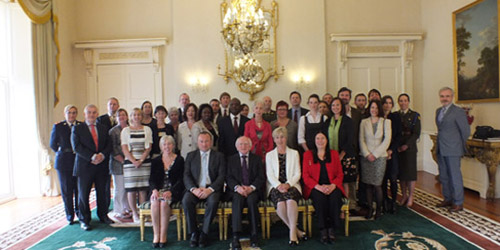Ireland’s First National Action Plan on UNSCR 1325 (2011-2014)
Ireland’s first National Action Plan was launched on 25th November 2011 at the Annual Seminar of the Joint Consortium on Gender-Based Violence by the Tánaiste and Minister for Foreign Affairs and Trade, Eamon Gilmore, and former President Mary Robinson.
The actions of the first plan spanned from 2011-2014 and focused on how Ireland could best promote and implement the objectives of United Nations Security Council 1325 through its programme-support activities, diplomatic advocacy and policy-making across the areas of peace, security and development.
The Plan was based on Five Pillars:
- Prevention
- Participation
- Protection
- Relief, Recovery and Rehabilitation
- Promotion
The Plan aimed to:
- Listen to the voices of women affected by conflict; strengthen women’s leadership and implement accountability mechanisms;
- Strengthen institutional capacities through comprehensive training of personnel deployed overseas;
- Support programmes to promote women’s participation in conflict prevention, peacekeeping, peace negotiations, peace building, and post conflict transition and governance; and
- Leverage Ireland’s participation in global and regional fora to champion the implementation of UNSCR 1325.
- Ireland combined an interdepartmental and civil society consultation with an innovative international cross-learning initiative involving participants from three post-conflict societies in its approach to its First National Action Plan. Women and men from Timor-Leste, Liberia and Ireland/Northern Ireland drew upon their direct experiences of how best to promote women’s leadership and interests in conflict resolution and peace-building.
- High-level meetings of the initiative took place in Northern Ireland and Timor-Leste in 2009, and in Liberia in April 2010. Regarded as an example of international best practice, the Final Report of the Cross-Learning Initiative Process showcases this unique feature of Ireland’s consultative process.
Monitoring and Evaluation

Ireland’s first National Action Plan on UNSCR 1325 established a Monitoring Group tasked with overseeing the implementation of its commitments. In keeping in the spirit of an open consultation process, the Monitoring Group was chaired by former Government Minister Liz McManus, and drew its membership from an equal split of Government agencies with responsibility of much of the actions in the Plan, and civil society and academia with relevant experience in Women, Peace and Security.
The Monitoring Group meets twice yearly to provide input and address issues related to the implementation of UNSCR 1325. As part of this monitoring process, a Mid-Term Progress Report was commissioned to evaluate and record the progress achieved in the implementation of Ireland’s NAP. The report was co-authored by independent consultants Bronagh Hinds and Karen McMinn and was published in July 2013 and presented to the Joint Committee for Foreign Affairs and Trade, the Joint Committee for Justice, Equality and Defence and the Joint Committee for the Implementation of the Good Friday Agreement.
An independently written Final Evaluation of the Implementation of Ireland’s National Action Plan on UNSCR 1325 on Women, Peace and Security (2011-2014) provided an in-depth assessment of the three-year lifespan of the first NAP. Actions were measured against outcomes and impacts, in a process that helped inform and reorient the development of Ireland’s second National Action Plan on Women, peace and Security.
The report was compiled by independent Gender Consultant Karen McMinn, and involved extensive interviews with implementing agencies, NGOs and Officers from the Department of Foreign Affairs and Trade as the drafters of the National Action Plan.
